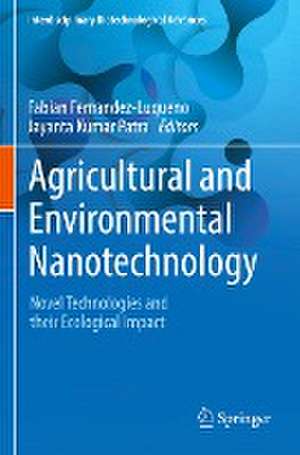Agricultural and Environmental Nanotechnology: Novel Technologies and their Ecological Impact: Interdisciplinary Biotechnological Advances
Editat de Fabian Fernandez-Luqueno, Jayanta Kumar Patraen Limba Engleză Paperback – 7 ian 2024
| Toate formatele și edițiile | Preț | Express |
|---|---|---|
| Paperback (1) | 1561.99 lei 43-57 zile | |
| Springer Nature Singapore – 7 ian 2024 | 1561.99 lei 43-57 zile | |
| Hardback (1) | 1568.29 lei 43-57 zile | |
| Springer Nature Singapore – 6 ian 2023 | 1568.29 lei 43-57 zile |
Din seria Interdisciplinary Biotechnological Advances
- 24%
 Preț: 924.06 lei
Preț: 924.06 lei - 18%
 Preț: 1107.73 lei
Preț: 1107.73 lei - 18%
 Preț: 1376.05 lei
Preț: 1376.05 lei - 18%
 Preț: 1388.85 lei
Preț: 1388.85 lei - 18%
 Preț: 1390.11 lei
Preț: 1390.11 lei - 18%
 Preț: 1392.33 lei
Preț: 1392.33 lei - 18%
 Preț: 1554.09 lei
Preț: 1554.09 lei - 18%
 Preț: 1224.36 lei
Preț: 1224.36 lei - 18%
 Preț: 1230.35 lei
Preț: 1230.35 lei - 18%
 Preț: 1556.01 lei
Preț: 1556.01 lei - 5%
 Preț: 1111.81 lei
Preț: 1111.81 lei - 18%
 Preț: 1220.75 lei
Preț: 1220.75 lei - 5%
 Preț: 1607.38 lei
Preț: 1607.38 lei - 24%
 Preț: 1059.17 lei
Preț: 1059.17 lei
Preț: 1561.99 lei
Preț vechi: 1904.87 lei
-18% Nou
Puncte Express: 2343
Preț estimativ în valută:
298.89€ • 312.85$ • 248.77£
298.89€ • 312.85$ • 248.77£
Carte tipărită la comandă
Livrare economică 31 martie-14 aprilie
Preluare comenzi: 021 569.72.76
Specificații
ISBN-13: 9789811954566
ISBN-10: 9811954569
Pagini: 674
Ilustrații: XI, 674 p. 1 illus.
Dimensiuni: 155 x 235 mm
Greutate: 0.95 kg
Ediția:1st ed. 2023
Editura: Springer Nature Singapore
Colecția Springer
Seria Interdisciplinary Biotechnological Advances
Locul publicării:Singapore, Singapore
ISBN-10: 9811954569
Pagini: 674
Ilustrații: XI, 674 p. 1 illus.
Dimensiuni: 155 x 235 mm
Greutate: 0.95 kg
Ediția:1st ed. 2023
Editura: Springer Nature Singapore
Colecția Springer
Seria Interdisciplinary Biotechnological Advances
Locul publicării:Singapore, Singapore
Cuprins
Section 1 An introduction to nanoagriculture, agronanobiotechnology and nanoremediation.- Chapter 1. Nanoagriculture: Advantages and drawbacks.- Chapter 2. Agronanobiotechnology: present and prospect.- Chapter 3. Nanoremediation.- Chapter 4. Cutting-edge technologies in agriculture without hampering sustainable development.- Section 2 Nanoagriculture.- Chapter 5. Controlled Delivery of Elements, Molecules, Genetic Material, or Organisms.- Chapter 6. Nanosensors for crop management.- Chapter 7. Nanotechnology for pest management.- Chapter 8. Nanotechnology in water and wastewater treatment.- Chapter 9. The contribution of the nanotechnology to the farmer wellbeing.- Section 3 Agronanobiotechnology.- Chapter 10. Magnetofection for plant breeding.- Chapter 11. Nano and OMICs technologies.- Chapter 12. Interactions between nanomaterials and plant-microbe partnership.- Chapter 13. Nanobiological pest control.- Section 4 Nanoremediation.- Chapter 14 Nanoremediation of heavy metals in agricultural soils.- Chapter 15 Nanoremediation of organic pollutants.- Chapter 16 Phytobial remediation.- Chapter 17 Nanobioremediation.- Section 5 Ecological impacts.- Chapter 18 Nanomaterials in the human food chain.- Chapter 19 Nanotechnological achievements and the environmental degradation.- Chapter 20 Accumulation of engineered nanomaterials in soil, water and air.- Chapter 21 Collateral effects of nanopollution on human and environmental health.
Notă biografică
Fernández-Luqueño Fabián
Center for Research and Advanced Studies of the National Polytechnic Institute (Cinvestav), Mexico.
Jayanta Kumar Patra
Research Institute of Biotechnology & Medical Converged Science, Dongguk University, Republic of Korea
Textul de pe ultima copertă
This book highlights the best practices regarding nanoscience and nanotechnology for agriculture and environmental sectors to shape sustainable development thought to improve the quality and quantity of the agriculture products and to decrease the collateral effect of nanotechnology in the ecosystems. Besides, leading nanotechnologies are showed and discussed to guarantee their proper management in lands and ecosystems. Therefore, nanotechnologies such as agronanobiotechnology, nanofertilization, pest control, magnetofection for plant breeding, plant molecular farming, OMICs technologies, phytonanotechnology, nanoremediation, etc. are described in five sections and 21 chapters. Undoubtedly it is an ideal and updated book for undergraduate or postgraduate students, and scientists or researchers involved in nanoscience, nanotechnology, crop production, and remediation technologies as well as for those researchers that solving technical problems regarding the crop management and the humanand environmental health without hampering the pursuit of sustainable development goals.
Caracteristici
Elaborates design, use, spreading, and management of nanotechnologies Provides information related to agricultural yields, recovery of degraded sites, and ecosystem health Guides and inspires responsible and smart management of nanotechnologies
